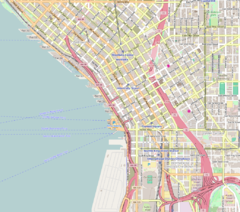Docusign Tower, previously the Wells Fargo Center, is a skyscraper in Seattle, in the U.S. state of Washington. Originally named First Interstate Center when completed in 1983, the 47-story, 574-foot (175 m) tower is now the ninth-tallest building in the city, and has 24 elevators and 941,000 square feet (87,400 m2) of rentable space.[5] The design work was done by The McKinley Architects, and it is owned by Chicago-based EQ Office.
| Docusign Tower | |
|---|---|
 Exterior of the Docusign Tower from the 73rd floor of the Columbia Center in 2012 | |
| Former names | First Interstate Tower, Wells Fargo Center |
| General information | |
| Type | Commercial offices |
| Location | 999 Third Avenue Seattle, Washington, U.S. |
| Coordinates | 47°36′18″N 122°20′03″W / 47.605°N 122.3341°W |
| Current tenants | Docusign |
| Completed | 1983 |
| Owner | EQ Office |
| Management | EQ Office |
| Height | |
| Roof | 174.96 m (574.0 ft) |
| Technical details | |
| Floor count | 47 |
| Floor area | 87,753 m2 (944,570 sq ft) |
| Lifts/elevators | 24 |
| Design and construction | |
| Architect(s) | McKinley Architects |
| Main contractor | Howard S. Wright Construction |
| Website | |
| 999thirdave | |
| References | |
| [1][2][3] [4] | |
In 2013, the building was purchased by Canada's Ivanhoé Cambridge from Beacon Capital Partners of Boston.[6] The building was renamed after First Interstate Bancorp was taken over by Wells Fargo in 1996. In 2019, the building was purchased by EQ Office.[7] Docusign took over naming rights in 2020 after expanding their lease within the building, which began in 2015.[8][9]
The exterior façade is composed of a six-sided, steel-framed tower that features a combination of tinted continuous double-glazed glass and polished spring rose granite panels. As is common with buildings in downtown Seattle, Docusign Tower rests on a slope. The eastern entrance facing Third Avenue is slightly more than two stories higher than the Western side facing Second Avenue. On the west side, the building has a public hill-climb on two flights of outdoor escalators that were encased in clear tubes until 2006 when they were updated with a simpler, yet more modern glass roof. The building has three levels of outdoor plazas.[citation needed] Several retail spaces face the west plaza.[10]
The site was previously occupied by the 12-story Olympic National Life building, which was demolished by implosion on the morning of Sunday, February 28, 1982. It was the first demolition by implosion in downtown Seattle.[11][12] One of the city's first steel skyscrapers, it was built in 1906 and was also known as the American Savings Bank and the Empire Building.[13][14]
See also
editReferences
edit- ^ "Emporis building ID 119378". Emporis. Archived from the original on March 7, 2016.
- ^ "Docusign Tower". SkyscraperPage.
- ^ Docusign Tower at Structurae
- ^ "Wells Fargo Center". Skyscraper Center. CTBUH. Retrieved 2017-07-01.
- ^ Warren, James R.; Henry Gordon; Karen Milburn (1986). Where Mountains Meet the Sea: An Illustrated History of Puget Sound. Northridge, CA: Windsor Publications. p. 243. ISBN 0-89781-175-5.
- ^ "Ivanhoe Cambridge buys 47-story Wells Fargo Center in Seattle for US$390M".
- ^ Stiles, Mark (June 28, 2019). "EQ Office invests another $1.2B in Seattle, this time for two trophy towers". Puget Sound Business Journal. Retrieved 2024-04-16.
- ^ Stiles, Marc (January 14, 2020). "Seattle's 999 Third Avenue tower to be renamed for expanding tech tenant". Puget Sound Business Journal. Retrieved January 15, 2020.
- ^ Demmitt, Jacob (December 8, 2015). "DocuSign moving Seattle headquarters to a different downtown office tower". GeekWire. Retrieved January 15, 2020.
- ^ "999 Third Avenue Retail" (PDF). JLL. Retrieved November 1, 2022.
- ^ Walker, Nick (February 28, 1982). "Seattle building implosion: Olympic National Life Building implosion, Feb. 28, 1982". KIRO-TV. Retrieved February 25, 2018 – via YouTube.
- ^ "Imploded: 650 pounds of explosive jelly and six seconds". Spokane Chronicle. Associated Press. March 1, 1982. p. 22.
- ^ "Going, going, going...gone". Eugene Register-Guard. Associated Press. March 1, 1982. p. 5A.
- ^ Dorpat, Paul (March 2, 2017). "Seattle has had two uppercase Big Snows — the most recent in 1916". The Seattle Times.
